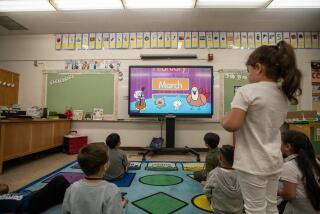It’s all about kids learning
Vacation ends Monday for most Los Angeles Unified elementary school students, but opening day this year might be more stressful for parents and teachers than for children.
That’s because hundreds of teachers considered competent last semester have now been branded ineffective by The Times’ “Grading the Teachers” project, which rated 6,000 elementary school instructors based on their students’ progress on California standards exams.
Our series has been both praised and excoriated for relying on test score trends and for listing teachers by name in an online database accessible to the public and accompanied by teachers’ comments.
“Now parents will be requesting other teachers whose scores are a bit better than the teacher who is currently teaching their child,” fretted fifth-grade teacher Anna M. Donskoy, rated “more effective than average” in The Times’ assessment.
“They will stand in line in the office crying and raising their voices,” she said. “And they will be frustrated, just like the principal who will have to deal with them and the office staff who will have to calm them down.”
It was clear from comments like hers that the rankings cut deep.
A “public stoning,” one teacher called it. She was among those we labeled “most effective,” but also among teachers laid off by the school district last year.
“Mean spirited and demoralizing” complained another, a 32-year classroom veteran branded “least effective” by The Times’ process.
And a “less effective than average” fifth-grade teacher pointed out that “name calling never amounts to much, whether it takes place in an elementary school classroom or within the pages of a newspaper.”
::
Researchers and Times reporters analyzed data on 6,000 third-, fourth- and fifth-grade teachers in LAUSD, then invited them to preview their rankings and post comments. About a third asked to see their scores, and 300 filed responses.
Scrolling through their comments is like eavesdropping in the teachers’ lunch room. Their angst, confusion, hurt feelings and relief reveal as much about our teaching corps as the “value-added” scores assigned to them.
Some were grateful for the information, if not the exposure.
“I’ve been teaching for 20 years, and this is the first time I’ve gotten an idea of how my students have fared in my classroom and how I am doing as a teacher,” wrote Sujata Duggal Landon, a “most effective” second- and third-grade teacher.
Many teachers with subpar ratings displayed a gratifying determination to, as one wrote, “step it up.”
“Making such OBJECTIVE value-added info public will spur competitive people such as myself to work twice as hard,” wrote Andre Noble, an “average” teacher with a classroom of fourth- and fifth-graders.
Second-grade teacher Juan Antonio Rodriguez “felt shocked, incredulous, saddened, embarrassed and disappointed upon seeing” his average score. “However, the bottom line is that none of this was the fault of [my] students. They deserve better.... This will certainly make me look deeper into my teaching practices.”
But many others defended their performance and challenged The Times’ calculations.
“I DO NOT appreciate the LA Times implying, with their ‘less effective’ ranking, that I was negligent in tending to my students’ education,” wrote Nam Phuong Pho, who listed years of test scores showing that her fifth-graders “hover in English and gain in math.”
Some offered up resumes thick with advanced degrees and honors, or classrooms weighted with behavior problems and slow learners.
“Please exclude the poor and minority students from my classroom data, and I can assure you that I am a highly effective teacher -- but then I would not have a job,” wrote Octavio Licon Gonzalez, who landed in the bottom tier, among “least effective” instructors.
Teachers mentioned “thinking outside the box” and “It takes a village to raise a child” so often, the comments took on “The dog ate my homework” status.
There were medical problems and maternity leaves, and blame heaped on team-teaching, scripted reading programs, split-grade classes, long-term subs, incompetent principals and unsupportive homes.
“If you’re going to list the names of teachers as ‘least effective’ then let’s do the same for parents,” wrote Mario Loeza, a “most effective” fourth-grade instructor. “9 out of 10 times, if you show me a student who’s failing, I can show you a parent that doesn’t follow through.”
::
I don’t have children in L.A. Unified anymore. Still, I checked the scores at my neighborhood campus and was relieved to find no ratings for the teachers who, 20 years ago, helped launch my first-born toward Stanford:
Mrs. Bucka, the kindergarten teacher who taught me as much as she taught my daughter; Mrs. Green, whose sensitive attention to a shy first-grader gave my child the confidence to push past problems; and Mrs. Anthony, whose “Concerns and Appreciations”
sessions helped calibrate my daughter’s moral compass.
How do you measure stuff like that on tests of skills in English or math? That’s what troubles teachers, and why so many pointed with such pride to what statisticians might consider insignificant factors. Even an “average” teacher knows those things matter.
“The real truth is that I get evaluated by more than 30 people every day,” wrote fourth-grade teacher Ashley Collett Tanger. “I get evaluated on whether or not I listen to them when they tell me things that they have never told anyone else ... when I have to break up a fight or mend a friendship ... when I stay after school to help kids with homework whose parents can’t or worse won’t.
“And I sure hope in my students’ eyes that I pass as being something more than ‘average.’ ”
We know that test scores are an incomplete way of measuring teachers. But good feelings and happy students aren’t enough either. Regardless of race, class or family status, children can and do excel with teachers who inspire and challenge them.
I’m sorry if teachers feel The Times set out to embarrass them. We don’t hate teachers; we do value children.
A poor score may humiliate a teacher now, but the alternative -- quiet mediocrity, played out in private -- shortchanges students who can’t afford silence.
sandy.banks@latimes.com
More to Read
Start your day right
Sign up for Essential California for news, features and recommendations from the L.A. Times and beyond in your inbox six days a week.
You may occasionally receive promotional content from the Los Angeles Times.







